Funding Friday: Eyeglass Frames Made From Recycled Water Bottles
I backed this project today and bought myself a new pair of eyeglasses in the process.
I backed this project today and bought myself a new pair of eyeglasses in the process.
Last night the Gotham Gal and I attended the annual benefit for the Scratch Foundation which provides financial support to the Scratch programming language and learning environment.
Mitch Resnick, founder of Scratch and leader of the Lifelong Kindergarten Group at the MIT Media Lab (I love that name so much I had to find a way to get it into this post), shared some numbers with the attendees last night:
In the last year, over 200 million people have used Scratch to make something, share something, or learn something.
I realize that not everyone who uses Scratch is a child, but the vast majority of them are.
There are roughly 2bn children on planet earth, so that means roughly 10% of our children used Scratch last year.
Think about that.
At our table, there were four high school students who I had invited to join us at the event. Two of them are ninth graders, just starting to learn to code and they are learning with Scratch. Two of them are seniors, experienced programmers who are experts in Java and a number of other languages. Four years ago, they learned to code on Scratch.
Scratch is the one ramp to learning to code. There really isn’t anything better to engage, excite, and inspire children to code something up and share it with the world.
And, right now, in 2018, 10% of our children are using it. I am confident that in a few years that number will be 30-50%, and I pray that some day it will be 100%.
In December I wrote about the Symphony Software Foundation as it was launching the NYC Open Source Fintech Meetup.
Yesterday the foundation announced a new name: FINOS.
FINOS is about supporting open source software efforts across the financial services industry.
Financial services has often lagged other industries in adopting open source software related development practices, but that situation is changing quickly. Quantitative trading firms like Jane Street have built entire businesses based on open source. And perhaps there is no better example of the degree to which open source is impacting financial services (and other industries of course) than bitcoin, ethereum, and other crypto projects.
FINOS Executive Director, Gabriele Columbro, described the FINOS mission as follows:
In the industries where open source has succeeded, independent entities such as foundations and trade organizations have played a critical role in fostering success. They have facilitated cooperation among players (often hard to do between fierce rivals) and encouraged dialogues necessary to solving common problems. This is precisely the role FINOS is playing in financial services.
Many of FINOS’ members are large global finance and tech companies such as Goldman Sachs, UBS, JP Morgan, GitHub, Thomson Reuters, and Red Hat. The accelerating adoption of open source in fintech is important not just for major financial institutions but also for emerging startups and younger companies looking to service incumbents or compete against them (or both). Examples among FINOS members include OpenFin and NodeSource.
Because financial services has always had an oversized impact on tech here in NYC, this is likely a huge boost to the NYC open source ecosystem too.
If you’re working in fintech I encourage you to get engaged with some of FINOS’ programs, either by just evaluating and checking out some of the work, or by getting actively involved by contributing code to a working group. If you’d like to hear more about FINOS and its work, you may want to attend their FinTech in Open Source Event Series this evening at 6:30pm where Gabriele Columbro will be interviewed by Spencer Mindlin of the Aite Group.
Finally, fintech is no different than any other “tech” sector in that we need more women, people of color, and other traditionally underrepresented communities at the table. The transparency and contribution models of open source projects can be a great on-ramp for anyone interested in a particular technology or problem domain. Together with K-12 CS education for all, open source can increase access to careers and opportunities historically all but closed to large segments of our society.
A number of USV folks are using the Brave browser on their phones and thinking about using it on desktop too.
We are not the average internet users at USV. We tend toward early adopter.
So I polled my twitter followers (which also skews early adopter) to see how many of them are using the Brave browser:
I am curious to get a sense of the adoption of the Brave browser: https://t.co/qSXLwnryBj
— Fred Wilson (@fredwilson) April 24, 2018
I don’t want to bias anyone who wants to complete the poll, so if you want to see the current results, pls complete it and you will see the results after you do that.
It’s interesting. I will say that much.
As I slowly heard toward moving the WordPress instance that hosts AVC to another provider, I was asked how large the audience was.
So I went and looked for the first time in a long while and sent that info to a potential new provider.
And I figured you all might be interested too.
So here are some screenshots from Google Analytics:
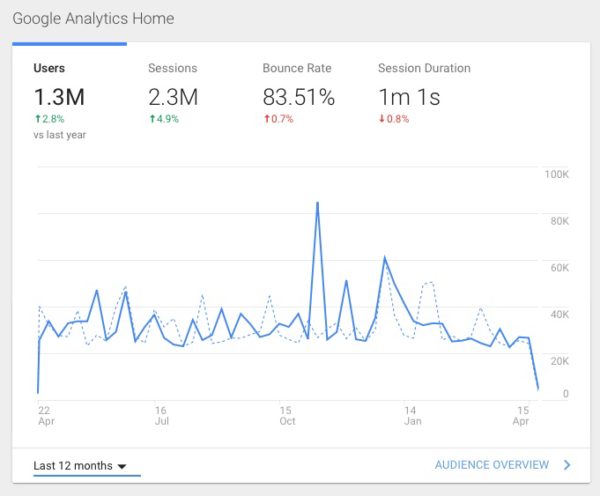
This is the total usage over the last twelve months.
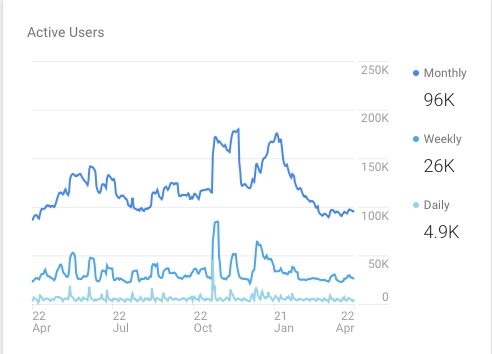
This is active users (28 day, 7 day, one day) over the past year.
And here is a bit more about where you all come from and what kind of device you use to read AVC.
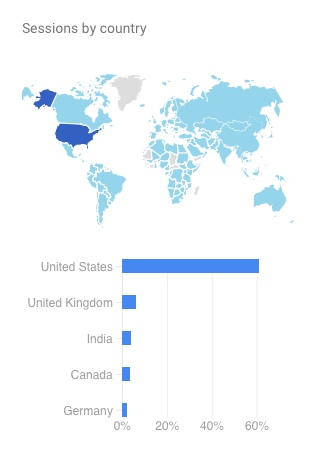
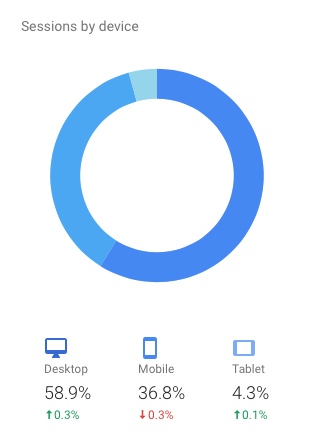
Google Finance and Yahoo Finance are two web services I have used daily since the early days of the Internet.
I have used Yahoo Finance since it first launched in January 1997.
But after Google Finance launched in 2006, I started using Google Finance more and eventually, it became my default finance site on the web.
Sometime in the last month or two, I can’t remember exactly when, Google revamped Google Finance.
The UI is cleaner and the service is much simpler.
But a lot of the power user features I had come to rely on in my daily work are either gone or buried so deeply that I can’t find them.
I also find it hard to search for a price quote now, which is kind of the most basic feature one would want in a service like this.
Anyway, I have switched a lot of my usage back to Yahoo Finance as a result.
But I am hoping that Google realizes that they messed some stuff up in the revamp and are working on fixing it.
Because I do prefer Google Finance. At least I did.
AVC regular William Mougayar posted a slide deck he calls State Of Tokens this week.
I like the deck a lot, particularly slide 34 (it’s a 36 slide deck), where he posits a timeline for the development of the blockchain ecosystem and where we are right now.
Here it is:
I backed this project today to bring a film about saving some of the earliest movies made to the big screen.
I wrote those words to a friend of mine yesterday. We are working on a project together.
He wrote me an email listing a whole bunch of investments to be made and where we are on them.
I read it and understood it, but it didn’t really register with me.
So we are going to make a spreadsheet with a few columns, total some stuff up, and look at it together.
The Gotham Gal calls that a “fredsheet” because I do better with numbers in a spreadsheet.
This is an example of presenting information in context.
I feel that how information is presented is often more powerful than the underlying data.
And when you want someone to understand what you are saying, it is best to put that information in the format that person is most comfortable in.
For me, that is often a sheet.
The news broke earlier this week that our portfolio company Coinbase has acquired Earn.com.
A lot of the press attention was centered around the fact that Earn’s CEO Balaji Srinivasan is becoming Coinbase’s CTO and the backstory about how Earn came out of a pivot from a failed Bitcoin mining company called 21.
But an overlooked aspect of this transaction is that Coinbase has acquired a business that is the crypto version of Mechanical Turk or, perhaps, Task Rabbit.
Earn.com allows a user to create a profile and earn Bitcoin by doing tasks. The tasks right now are centered around the crypto sector (analyze a white paper, accept an incoming email from a recruiter, etc). But if you squint, you can imagine how this mechanic could be extended to all sorts of other tasks.
Brian Armstrong, Coinbase’s founder and CEO, tweeted about this yesterday:
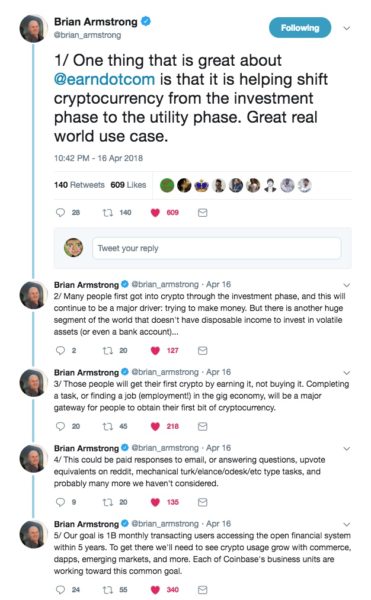
It is not enough for all of us to be buying, selling, and holding crypto assets. Earning them is a very important function in the development of an ecosystem. So I am excited to see Coinbase supporting and investing in a business where users can earn crypto assets and my hope is that this becomes something as meaningful as what Amazon has done with Mechanical Turk over the years.